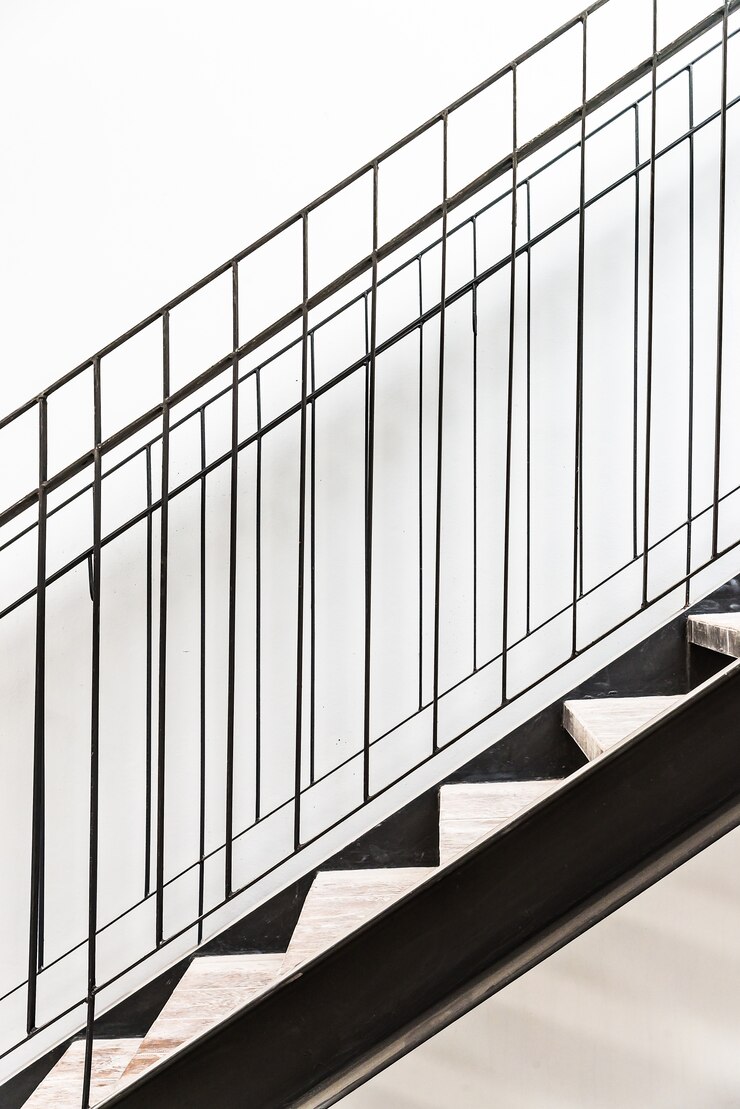When installing metal stairs in any building, making the right choice is crucial. Metal stairs combine strength, versatility, and aesthetic appeal. Below, we will discuss the key factors to consider when selecting metal stairs, including the metal stair stringer.
Metal Stairs
Metal stairs are a popular choice when it comes to selecting a durable, resilient, and reliable option. They are resistant to wear, corrosion, and harsh weather conditions, making them suitable for both indoor and outdoor installations. An easy stair railing is also manufactured, which has recently attracted significant attention.
Regardless of your preferences or style, metal stairs can be designed in various forms. For example, they can be minimalist with simple designs or transformed into intricately crafted cast-iron styles in the hands of skilled specialists.
Unlike wood, metal does not warp, crack, or require frequent refinishing. Regular cleaning and the application of protective coatings are sufficient. Metal stairs can also be designed with non-slip surfaces and sturdy handrails, ensuring safety in both residential and commercial spaces.
It is also worth noting that many metals are recyclable, making metal stairs an environmentally responsible choice that supports sustainable construction.
Why Making the Right Choice Matters
The right choice of metal stairs ensures the safety, functionality, and visual appeal of a space. Since stairs are subject to frequent use, they can wear out, weaken, and potentially become a safety hazard. Therefore, it is essential to make a thoughtful and informed decision when choosing fundamental elements of a building.
Opt for materials like stainless steel or galvanized iron that are resistant to corrosion, heavy loads, and environmental impacts, ensuring long-term durability.
Different metals can express an artistic metalwork. For instance, cast iron is ideal for intricate designs, while steel fits modern and minimalist styles.
The selected metal should complement the architectural style of your space. Polished steel provides a contemporary look, while cast iron often highlights a classic aesthetic. We can also highlight the wrought iron stair railing which is both durable and strong.
Types of Metals Used for Stairs
Here are some metals used by the metal construction company All Metal Constructions for manufacturing metal stairs:
Steel
Known for its high durability, steel can bear heavy loads and offers design flexibility, including curved or spiral structures.
Aluminum
Lightweight, making it easier to transport and install. Being one of the metal construction materials, aluminum is corrosion-resistant, reducing maintenance costs.
Stainless Steel
Offers excellent corrosion resistance without the need for additional treatments like galvanization. Ideal for buildings where moisture or chemical exposure is frequent.
Cast Iron
Cast iron provides a strong foundation for metal stairs while maintaining an elegant appearance. It can also be crafted into complex designs, suitable for both modern and classic styles.
Metal Stair Installation
Another advantage of metal stairs is time efficiency. They are typically pre-manufactured by specialists in factories, ensuring high quality, strength, and reliability. Once completed, the stairs are transported to the site and installed in various areas of the building.
In such cases, metal stairs are often secured with screws, speeding up the installation process. In addition to stair manufacturing, All Metal Constructions offers other metal products, including a corrugated metal pipe, metal hangers, constructions, and more.
How to Choose Metal Stairs for Residential and Commercial Spaces
Though the needs of homes and businesses differ, some key factors apply to both choices, including durability:
- Commercial buildings: Steel stairs are ideal due to their durability, especially in public spaces with less intense pedestrian traffic.
- Residential buildings: While aesthetics often take priority, durability remains crucial to ensure long-term reliability.
Aesthetic Appeal
- Commercial spaces: Minimalist metal stairs can highlight a modern interior, making them a common choice for business settings.
- Residential spaces: Design often focuses on elegance and a personalized touch to create a unique and welcoming atmosphere.
Maintenance
Metal stairs require minimal upkeep compared to wood or concrete alternatives. Although they don’t need varnishing or special coatings, regular cleaning with water and mild solutions is recommended.
Safety Features
Non-slip surfaces increase safety by reducing the risk of slipping. This is particularly important in commercial areas with heavy foot traffic and in residential spaces for the safety of family members.
Metal stairs are an excellent solution for both commercial and residential spaces that require strength, reliability, and quick installation. They offer high durability, design variety, and minimal maintenance. Choosing the right metal stairs will balance your space’s functional and aesthetic needs. For long-lasting results, consult specialized services to ensure your building benefits from a reliable and stylish investment.

